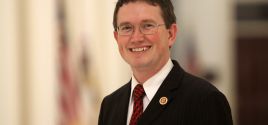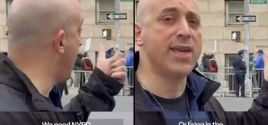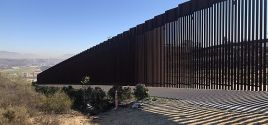Overseas, Big Britain is watchingBoston GlobeApr. 05, 2006 |
Popular 
Rep. Thomas Massie Warns Congress is Trying to Pass Hate Speech Laws to Outlaw Criticism of Israel

ADL Urged Congress to Pass FISA Law Spying on Americans to 'Protect Israel'

'Sniper Seen on Roof Overlooking Pro-Palestine Protest' at Indiana University

Claim Jewish Student Was 'Stabbed In The Eye' by Pro-Palestine Protester Draws Mockery After Video Released

Axios Poll: Majority of Americans Now Want Mass Deportations
 LONDON -- Here's a sign you won't see when you get off the plane at London's Heathrow Airport: Welcome to the surveillance capital of the entire world. Great Britain has become what the Observer newspaper recently called ''CCTV [closed-circuit television] nation," with a guesstimated 4 million public and private surveillance cameras in use. Most of them are in London, where it is said that the average citizen shows up on screen as many as 300 times a day. ''This is one of the few areas where Britain has the lead in our trans-Atlantic partnership," jokes Barry Steinhardt, director of the American Civil Liberties Union's technology and liberty program. It's all very abstract until you realize -- that's me they're looking at! So I assume that there are dozens of shots of me walking around Knightsbridge in that silly Andy Capp hat I bought at Harrods. (It was unseasonably cold; what could I do?) Or of my wife and me navigating the shopping stalls on Portobello Road, begging our son -- in vain -- not to spend 10 pounds on an obviously fake Ronaldinho soccer jersey worth about 25 cents. Great Britain is plunging ever deeper into citizen monitoring. There are signs on the famous London Underground that all activity inside the train carriages will soon be videotaped. Last month the United Kingdom announced plans to install surveillance cams on all the nation's roads and to store the data for two years. The country far outstrips the United States in the controversial practice of creating DNA data banks, and the British government plans to require citizens to carry biometric identity cards -- possibly including fingerprints or retinal scans -- starting in 2008. So what do we think of all this? On the surface, Britons seem inured to the Big Brother intrusions into their lives. As in the United States, there have been isolated scandals, with cameras trained into bedrooms, or used to catch couples ''snogging" in apartment block entryways. But many citizens remember seeing the killers of 2-year-old James Bulger on grainy surveillance videos in 1993. And several of the suspects in last summer's London subway bombings were quickly identified using surveillance photos. Can it happen here? Of course it can, and it is happening here. Civil libertarians note that both Boston's Freedom Trail and Philadelphia's Independence Mall are amply wired up with video cams. After the London bombings, several US mayors and Senator Hillary Rodham Clinton called for more video surveillance installations. Last year Congress passed legislation that will require Americans to carry so-called ''real ID cards," a close approximation of national identity cards, starting in 2008. Where are the legal challenges to these measures? ''There is a sense among a lot of people that there ought to be some law out there protecting them," says the ACLU's Steinhardt. ''But the truth is that the US is the Wild West when it comes to privacy protection. People say, 'Why aren't you going to sue?' Well, there are no laws." Post Sept. 11, Americans are becoming more comfortable with intrusions into their privacy zones. Aside from some arm-flapping from the usual suspects, I can't discern any hardpan opposition to President Bush's domestic surveillance program. But why not? At the very least I'd like to know how many American citizens were wiretapped by the National Security Agency, and why. I am a recent convert to the thrills and spills of Fox television's popular anti-terrorism thriller, ''24," where wiretapping and video satellite surveillance are as routine as drinking from a glass of water. Hardly 10 minutes seem to elapse in the fictional Counter Terrorism Unit without an agent asking a computer programmer, ''Can we patch into that conversation?" The answer is always, ''Yeah -- give me a minute." Never, ''Maybe we should talk to a judge." I understand, it's a TV show. And I understand that in real life there are real bad guys out there, mugging, raping, dealing drugs, and in some cases wishing our society serious harm. But I don't want our country to be like Great Britain. I wouldn't entrust my privacy to this administration, the previous administration, or to the next administration. And I don't want strangers watching me walk down the street in my silly hat. |



